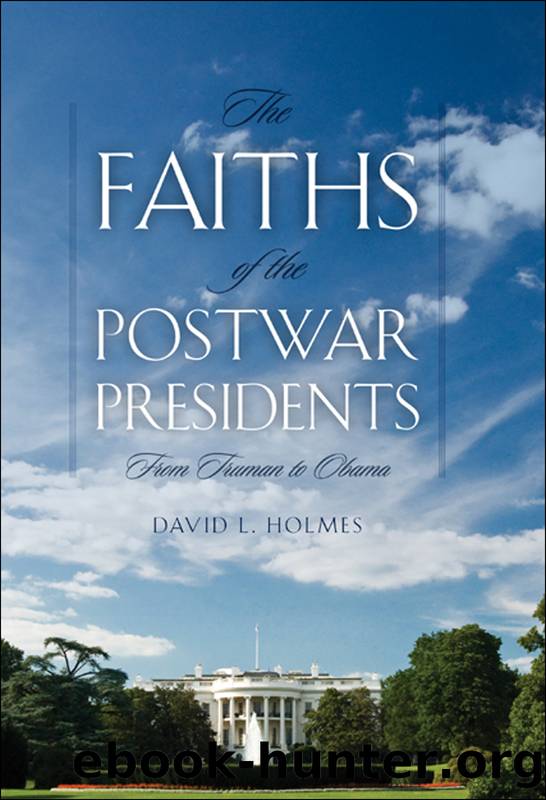The Faiths of the Postwar Presidents by David L. Holmes

Author:David L. Holmes
Language: eng
Format: epub
ISBN: 978-0-8203-3963-4
Publisher: University of Georgia Press
Published: 2012-04-25T00:00:00+00:00
George Herbert Walker Bush
1924 â PRESIDENT FROM 1989 TO 1993
The old house in Beijing that served as a makeshift church was unremarkable, ill-kept, and for the American envoy and his wife, a far cry from the traditional Episcopal sanctuaries of home. The services were in Chinese. The ministers were Anglican, Methodist, and Presbyterian. The Sunday congregationâabout a dozen in all, typical for this house-churchâincluded a mix of African, European, and Asian Protestants whose native tongues made an enthusiastic cacophony of familiar hymns.
But for the American envoy (or unofficial ambassador) to China, George Herbert Walker Bush, the odd setting became a treasured church home, offering âunbelievableâ and âmost movingâ services that (as he wrote in his diary) âwe wouldnât miss.â1 On a typical Sunday, Bush wrote: âSunday, our little church service. Head countâtwo African ladies, one African man, three Canadians, two Bushes, four Chinese in the audience, and one preacher. They sing the most wonderful hymns. âNearer My God to Thee,â âHoly, Holy, Holy.â All the old favorites. It is a nice touch.â2
No service in that unlikely sanctuary may have been more important to the future president and his wife, Barbara, than the one that took place on June 29, 1975, at the Chongwenmen Church. Bush was serving as U.S. envoy to China during a time when that countryâs Communist government severely restricted the practice of Christianity. Yet he had managed not only to convince the Chinese to permit the baptism of his youngest child on that day; he had also managed to gather three of her four far-flung brothers (including the eldest, George W.) for the event. It was, as Bush wrote, âA very special day, an occasion.â
Dorothy, or âDoroâ as she was called, was fifteen years old, the youngest of five children, and the only daughter. She was the girl Bush had prayed for after the loss of the coupleâs second child, Robin, who died of leukemia in 1959, just weeks before her fourth birthday.
Doroâs baptism had been deferred several times because of what Barbara Bush described as âdeaths, politics, long distances, and floods.â3 But now, in the unlikely location of postâCultural Revolutionary China, that day had finally come. George Bushâs diary entry for June 29 reads: âThe big thing that dayâDoro was baptized at our little Chinese church. The ministers were extremely happy and smilingâpleasant, wonderful.â4
While the ecumenical Chinese ministers presided at the baptism, suspicious government representatives photographed and tape-recorded the strange ceremony. As far as the Bushes knew, Doro was the first American citizen publicly baptized in China since the Communists assumed power in 1949.5
âArranging for a baptism in a communist country is no small feat,â Doro later wrote. Able at fifteen to pick her own godfather, she sent a telegram to âone of Dadâs funniest and most handsome friendsâ in Maine, inviting him to come immediately to China for the service. The telegram arrived in Chinese.6
It was a memorable event in a lifetime of religious practice that holds little mystery. George Herbert Walker Bush was an
Download
This site does not store any files on its server. We only index and link to content provided by other sites. Please contact the content providers to delete copyright contents if any and email us, we'll remove relevant links or contents immediately.
Blood and Oil by Bradley Hope(1558)
Wandering in Strange Lands by Morgan Jerkins(1419)
Ambition and Desire: The Dangerous Life of Josephine Bonaparte by Kate Williams(1385)
Daniel Holmes: A Memoir From Malta's Prison: From a cage, on a rock, in a puddle... by Daniel Holmes(1331)
Twelve Caesars by Mary Beard(1313)
It Was All a Lie by Stuart Stevens;(1294)
The First Conspiracy by Brad Meltzer & Josh Mensch(1167)
What Really Happened: The Death of Hitler by Robert J. Hutchinson(1157)
London in the Twentieth Century by Jerry White(1145)
The Japanese by Christopher Harding(1131)
Time of the Magicians by Wolfram Eilenberger(1125)
Twilight of the Gods by Ian W. Toll(1117)
Cleopatra by Alberto Angela(1093)
A Woman by Sibilla Aleramo(1092)
Lenin: A Biography by Robert Service(1074)
John (Penguin Monarchs) by Nicholas Vincent(1068)
The Devil You Know by Charles M. Blow(1024)
Reading for Life by Philip Davis(1023)
The Life of William Faulkner by Carl Rollyson(982)
